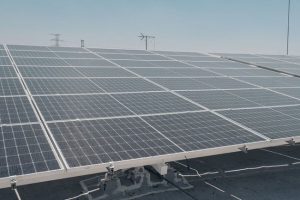Lack of electricity in Nigeria critically affects the overall development of its economy. The country has the world’s largest absolute electricity access deficit, with 45 per cent of the population (90 million) lacking access to the electricity grid, a recent World Bank report states. Large disparities exist in access to electricity between urban areas (84 per cent) and rural ones (26 per cent).

This deficit has increased by over seven million citizens over the last decade as the pace of population growth has overtaken the pace of electrification, the report adds. This disproportionately affects vulnerable groups, particularly women and children, worsening existing inequalities.
Electricity is an essential part of modern life and important in driving socio-economic development. People’s needs for electricity vary from powering home appliances, operating machines, enabling communication, storing agricultural produce, preserving medical equipment, and transportation, to mention but a few. Nigeria should be able to transmit about 15,000 megawatts (MW) of electricity, but due to weak and ageing infrastructure, it transmits less than 5000 MW of about 13,000MW of electricity generated to its over 200 million citizens.
These recurring energy challenges have further worsened the country’s economy and forced vulnerable groups’ reliance on unclean and unsustainable sources like kerosene and firewood, leading to respiratory illnesses and deforestation.
In a World Health Organisation (WHO) report, standard operating procedures for most hospitals require energy use for water supply, temperature control, lighting, ventilation, and clinical processes. Primary health centres, PHCs are supposed to be the first places to go for health services in rural areas, but many of these facilities in Nigeria underperform due to lack of energy access.
A recent report by the Sustainable Energy for All (SEforALL) estimates that 40 per cent of PHCs in Nigeria lack access to electricity. This lack of reliable access to energy continues to undermine the coverage and quality of basic healthcare and social welfare services delivered to millions of people in the country.
Pregnant women still give birth to their babies in the dark and critical surgeries are carried out using candlelight and torchlights. It’s literally a matter of life and death for many poor sick children because there is no capacity to preserve vaccines in a refrigerated environment. Also, girls are prone to attacks when fetching firewood in most villages and lack access to electricity to do homework after school.
Nigeria’s recurring electricity challenges have further resulted in weakened industrialisation, unemployment, the withdrawal of foreign investments, and her inability to compete in the global market. The World Bank estimates that Nigeria loses about $29 billion a year resulting from unreliable electricity.
In a recent report, the Association of Small Business Owners of Nigeria stated that 25 per cent of manufacturing businesses have ceased operations so far in 2023 alone. The closures is aggravated due to Nigeria’s inadequacy to compete in the global industrial market owing to its slow integration of heavy innovative technologies, which require stable and reliable power supply.
Bridging the energy gap through renewable energy
Access to reliable and affordable energy is essential for socio-economic development and the overall well-being of communities. In Nigeria, decentralised renewable energy solutions have great potential to bridge the energy gap and provide access to electricity in both rural and urban centres. According to a recent IRENA release, renewable energy can help Nigeria not only meet its energy needs but also power sustainable economic growth and create jobs while achieving global climate and sustainable development objectives.
Adopting renewable energy sources like solar, biomass, and hydro presents a compelling solution to address energy poverty and promote sustainable development in Nigeria. Renewable energy will be more affordable and accessible to last-mile communities where grid extension is expensive. Renewable energy sources, such as solar PV and mini-grids can generate electricity for hospitals, schools, companies, farm operations, transportation, and powering home appliances, among others.
Women often require energy for productive activities like sewing, processing agricultural products, and running small businesses. Renewable solutions like solar-powered lanterns and micro grids can address these specific needs, empowering women and contributing to their economic independence. The adoption of clean cooking technologies serves as a suitable alternative to save their health and environmental hazards.
The way forward in bridging the energy gap:
- Federal and state governments should implement supportive policies that incentivise investments in renewable energy and facilitate grid integration.
- Removal or grant of tax waivers on imported renewable energy equipment and streamlining of licensing procedures in Nigeria.
- Improving the income of rural women to catalyse the achievement of transition to clean energy.
- There should be more public-private partnerships, i.e. collaborative efforts between the government, private sector, and NGOs like renewable energy-driven associations like the Renewable Energy Association of Nigeria (REAN) to leverage resources and expertise for the implementation of renewable energy projects, facilitate project monitoring, and collectively address challenges.
- State and local government should invest in efficient clean stove programs for women and small-scale clean energy agroprocessing machines.
- Innovative investment for implementing renewable energy and removal of bottlenecks from local financial institutions.
- Adequate education and training should be provided for women, especially in rural areas, in the use of clean cooking technologies and solar energy systems.
- Innovative financing models, such as micro-finance and green bonds, are accessible to renewable energy developers to design projects for low-income households and communities.
- Adopting demand-side subsidies and grants to make renewable energy solutions more affordable for low-income households and communities.
- Promoting public awareness by stakeholders like the Renewable Energy Association of Nigeria to create awareness and more adoption of renewable energy and to further speed up Nigeria’s energy transition targets.
By Ayobami Adedinni and Godwin Jimoh, Renewable Energy Association of Nigeria (REAN)
